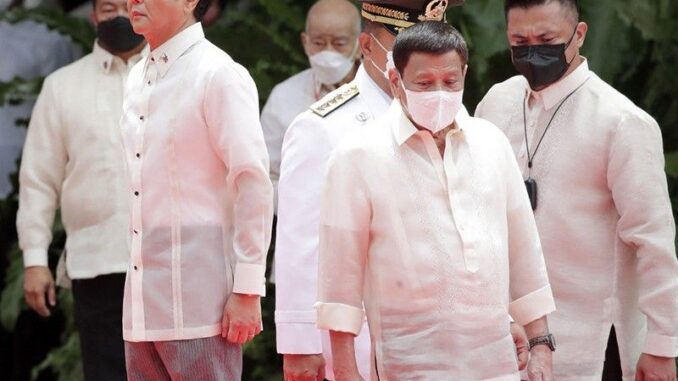
MANILA, Philippines — Human rights groups denounced what they called attempts by President Ferdinand Marcos Jr. to “deodorize” his administration’s rights record on International Human Rights Day, pointing to documented cases of extrajudicial killings and other rights violations under his watch.
In separate statements on Tuesday, December 10, human rights organizations Karapatan, International Coalition for Human Rights in the Philippines (ICHRP) and Philippine Alliance for Human Rights Advocates (PAHRA) demanded accountability for past and ongoing human rights violations, including ongoing extrajudicial killings in the government’s anti-illegal drugs operations.
Criticism of Marcos came as the government launched on Tuesday the Philippine Human Rights Action Plan, which Karapatan brushed off as his “most ambitious PR gimmick to date.”
The Philippine Human Rights Action Plan has been billed as the Philippines government’s “comprehensive blueprint” for addressing human rights issues.
It is part of the government’s commitments following the conclusion of the UN joint program on human rights in July 2024, a three-year initiative that sought to address gaps in human rights protection in the Philippines through “capacity-building.”
Karapatan Secretary General Cristina Palabay said the administration’s executive orders and task forces for investigating human rights “cannot gloss over the crimes that have been perpetrated under his watch.”
RELATED: DOJ forms task force to probe drug war killings | President Marcos forms human rights ‘super body’
The group has documented 119 extrajudicial killings of activists, rights advocates, farmers and ordinary citizens since Marcos assumed office in July 2022.
A group tracking drug war killings under Marcos, based at the University of the Philippines’ Third World Studies Center, has documented over 800 related cases since the start of his term.
This, for Palabay, was “a far cry from [Marcos’] claims of a ‘bloodless’ drug war” — the words the president used to describe his approach to curbing illegal drug use in his State of the Nation Address in July.
Rights groups also pointed to the recent public feuding between the president and his former running-mate, Vice President Sara Duterte, as evidence of how political conflicts detract from addressing human rights issues.
“Enough with the distractions caused by dynastic conflicts. Human rights must be the top priority in governance, not an afterthought,” PAHRA Secretary-General Egay Cabalitan said.
“Human rights are not negotiable, nor should they be sidelined by political games,” Cabalitan added.
Palabay criticized Marcos continuing “Duterte-era” policies and programs, such as violent police operations on suspected drug users and the use of anti-terror laws against activists.
Marcos has also refused to disband the National Task Force to End Local Communist Armed Conflict — an anti-insurgency body created in 2018 under Duterte.
“His militarist policy in dealing with insurgency has turned vast areas of the countryside into war zones, where villagers are subjected to food and economic blockades and civilian authority is undermined by the military’s repressive presence,” Palabay added.
Political killings under Duterte
ICHRP challenged the Department of Justice to expand its investigation beyond former President Rodrigo Duterte’s drug war killings to include the “political killings directed against the people’s movement.”
In doing so, the group spotlighted the call for justice of Liezel Asuncion, the wife of red-tagged labor leader Emmanuel Asuncion who was one of nine people killed in a police operation in 2019.
“If this agency right here is serious in its mandate, we challenge them to take a hard look at the evidence of gross violations of International Humanitarian Law under Duterte,” Asuncion said in ICHRP’s statement.
One rights group stressed that such violations continue under the current administration. Charm Maranan, spokesperson of rights group Defend Southern Tagalog, cited the case of Jay-el Maligday, an Indigenous Mangyan student leader who was allegedly gunned down by the military and falsely labeled as a guerilla fighter early this year.
The community maintained that Maligday was a student active in school politics and a church worker in Bulalacao, Oriental Mindoro.
“The case of Jay-el Maligday is just one of many repeated human rights violations in our region. Blood continues to flow heavily in Southern Tagalog,” Maranan said in Filipino.
‘Raking dirt’
These rights groups’ criticisms come as the House of Representatives, dominated by Marcos allies, conduct simultaneous investigations into both the Duterte administration’s drug war killings through the quad committee, and allegations of Vice President Sara Duterte’s irregular use of confidential funds through its good government committee.
For Palabay, however, these congressional probes should not distract from the broader human rights situation under the current administration.
“No matter how much he tries to prettify his image by raking dirt on the Dutertes, Ferdinand Marcos Jr.’s own hands are bloodied by human rights violations,” she said.





Be the first to comment